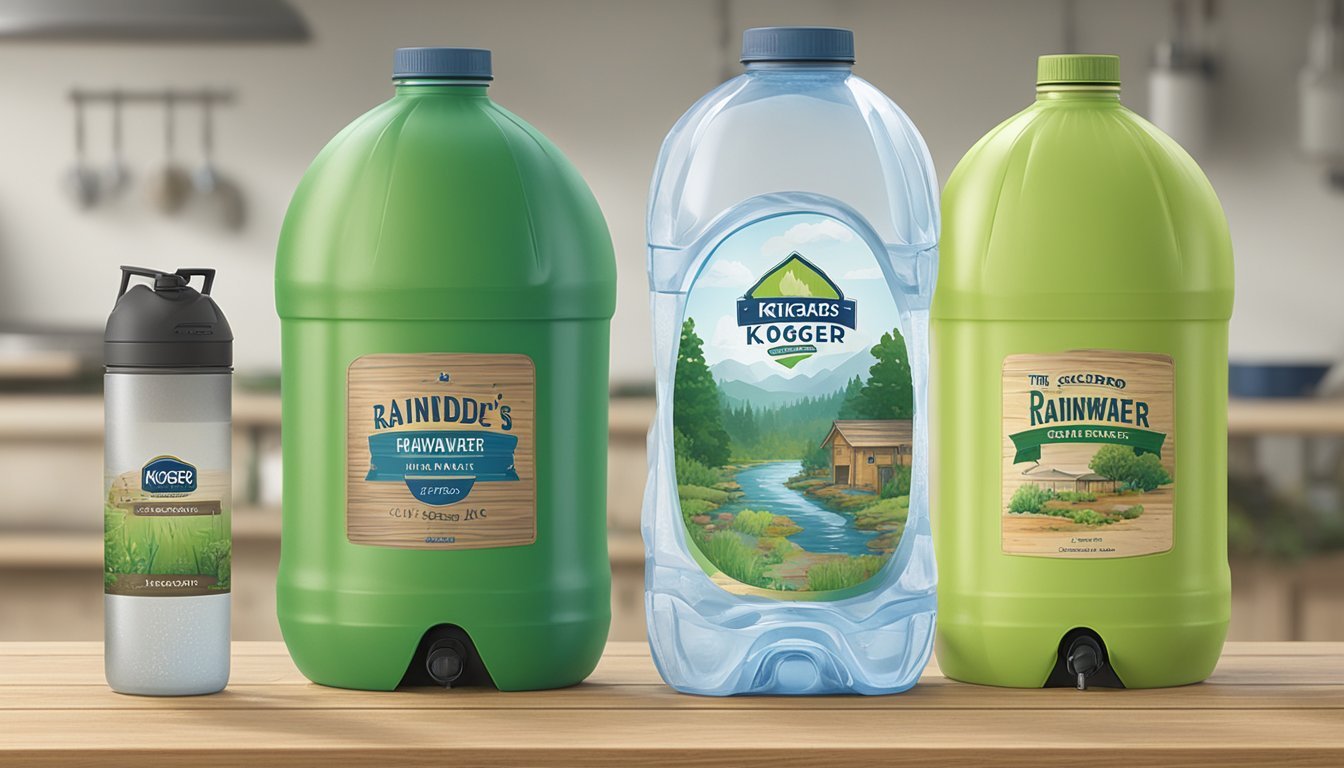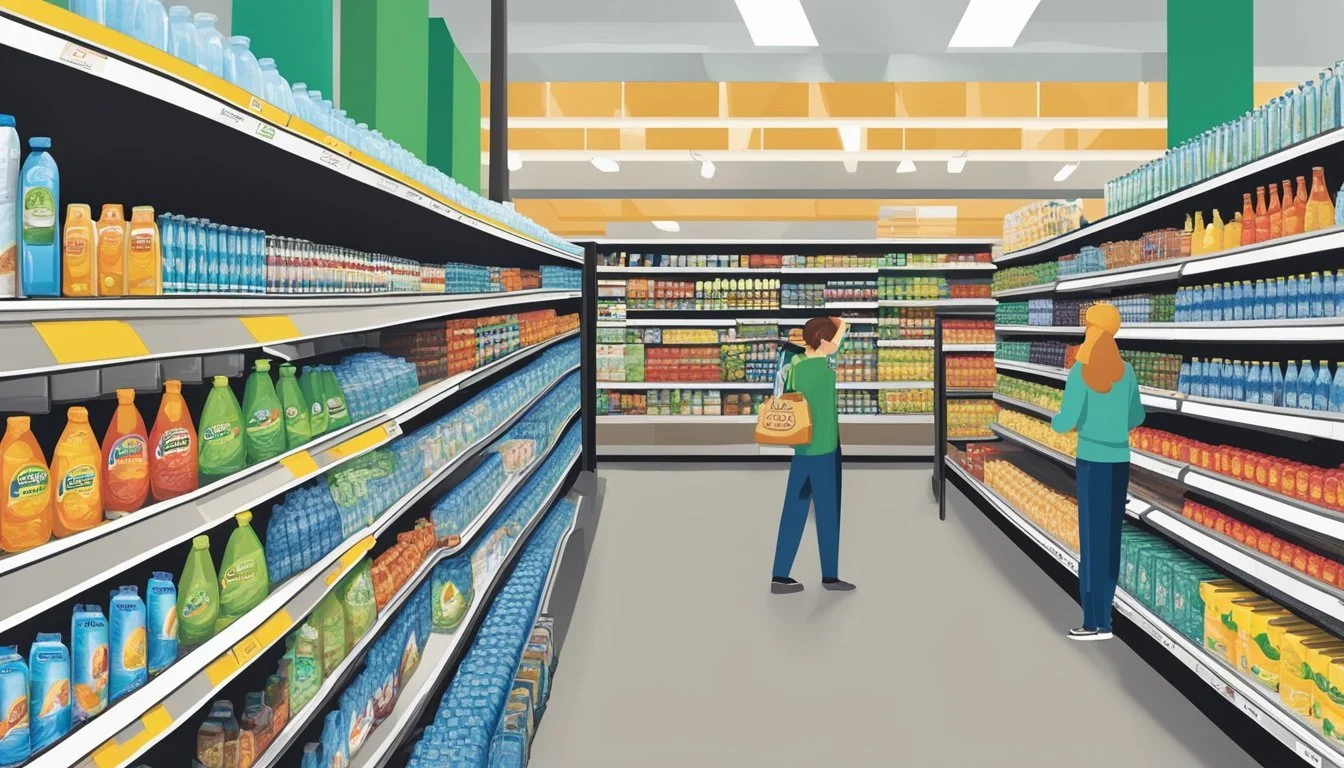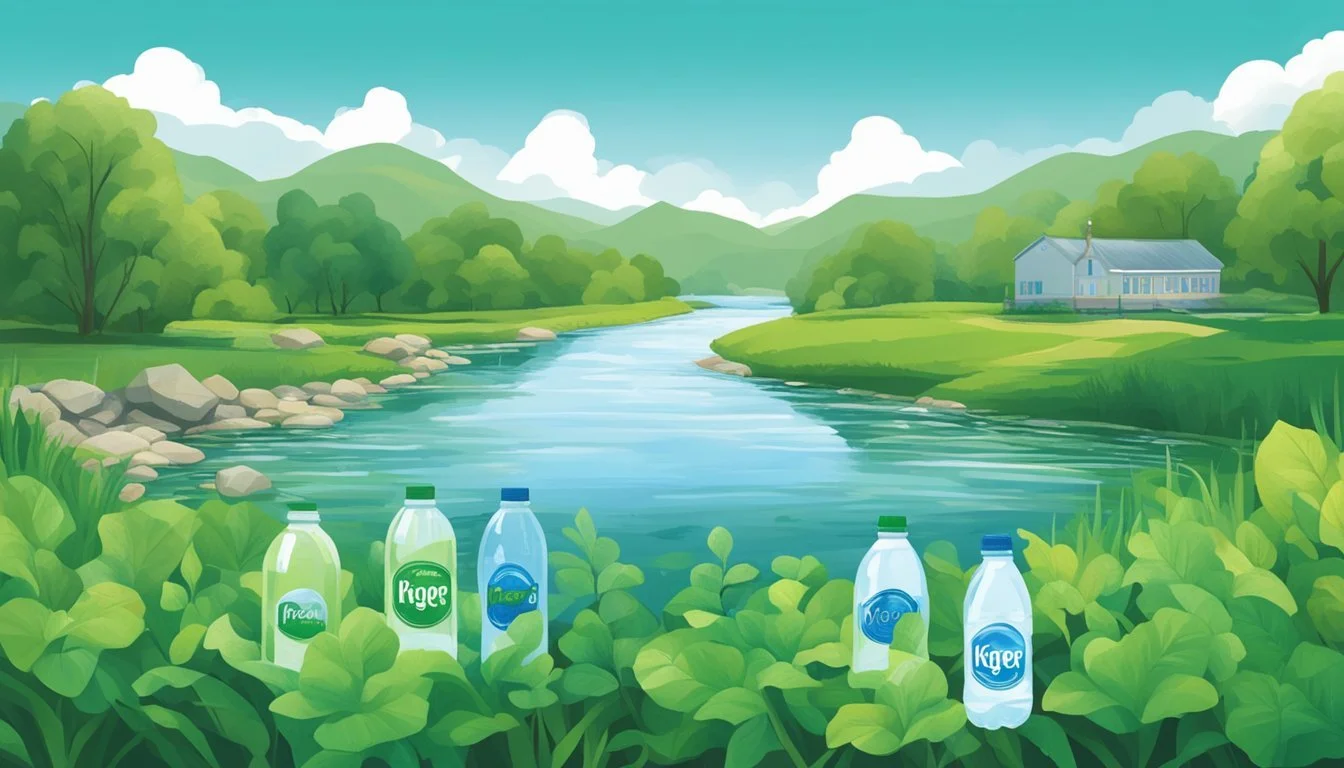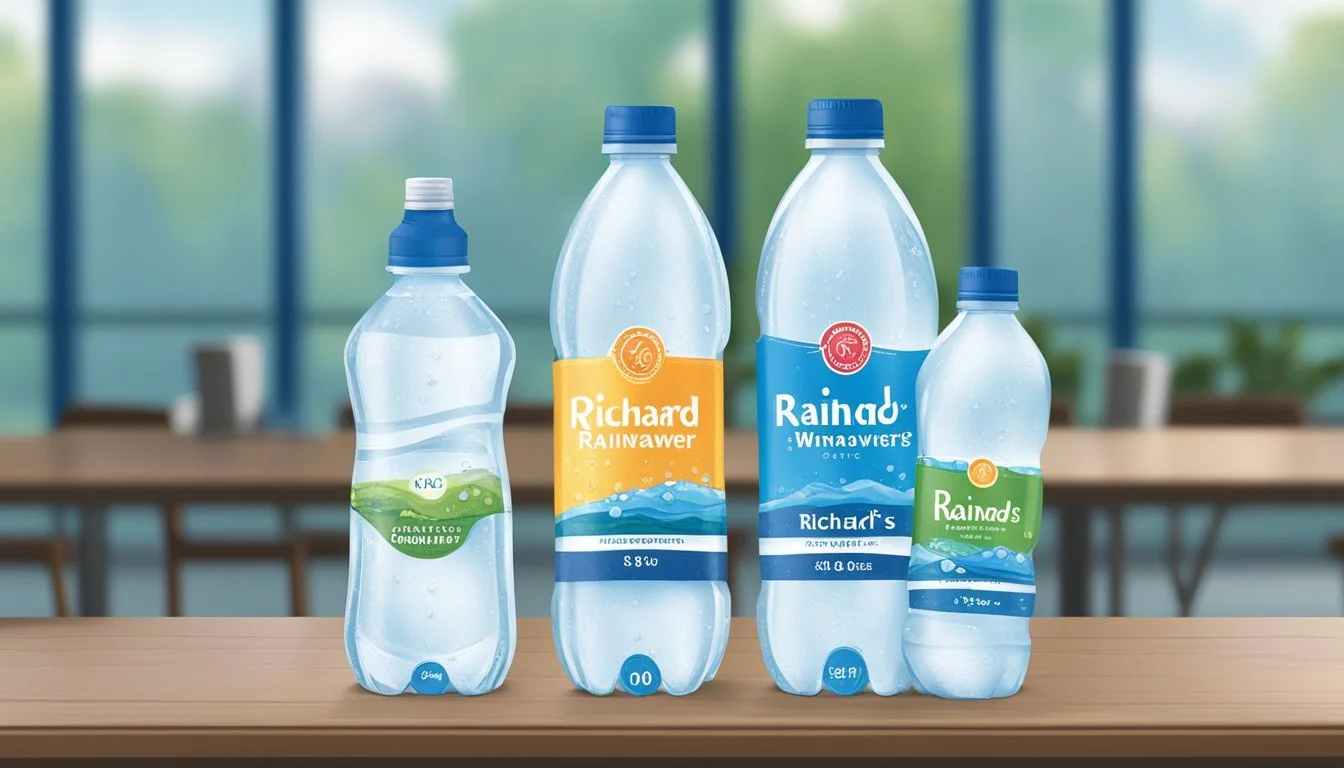Kroger vs. Richard’s Rainwater
A Comparative Review of Bottled Water Quality
Choosing the best bottled water between Kroger and Richard's Rainwater depends on various factors, including taste, purity, and environmental impact. Kroger's bottled water meets FDA regulations and is generally considered safe, but there are lingering concerns about contaminants like microplastics and BPA. Many of their bottles have transitioned to being BPA-free, which alleviates some health concerns. Despite this, the environmental toll of plastic bottles remains a significant drawback.
Richard's Rainwater offers a unique approach by capturing rainwater before it touches the ground, claiming to provide a purer product without needing chlorine, fluoride, or ammonia. This method not only enhances the water's cleanliness but also promotes sustainability by reducing the need for plastic packaging through their use of cans. The company's commitment to environmental stewardship may appeal to eco-conscious consumers looking for an alternative to traditional bottled water.
Ultimately, the choice between Kroger and Richard’s Rainwater will come down to individual priorities. If safety, regulatory compliance, and convenience are top factors, Kroger might be appealing. On the other hand, for those valuing purity and sustainability, Richard's Rainwater stands out as a compelling option.
Background
This section explores the key characteristics and histories of Kroger and Richard's Rainwater, as well as the broader evolution of bottled water over time. Understanding these contexts will assist in comparing their products.
Kroger Company Profile
Kroger, founded in 1883 by Bernard Kroger in Cincinnati, Ohio, is an established American retail company. It operates over 2,700 grocery stores across the United States.
Product Range: Kroger's product line spans various categories, including food, beverages, and household items.
Bottled Water: Kroger offers bottled water under its private label, adhering to FDA safety regulations. While BPA-free options are available, environmental concerns remain due to plastic pollution and waste.
Richard's Rainwater Company Overview
Richard's Rainwater, based in Dripping Springs, Texas, is a unique bottled water brand that sources its water from rainfall. Richard Heinichen founded the company, and Taylor O'Neil is the current CEO.
Sourcing and Production: The water is harvested from rain, purified, and bottled in glass and BPA-free plastic, catering to eco-conscious consumers.
Distribution: The product is sold at Whole Foods, HEB, Kroger, and Albertsons, highlighting its growing market presence. In 2023, sales were projected to exceed $10 million, showcasing rapid growth.
The Evolution of Bottled Water
Early Beginnings: Bottled water's history dates back to the early 19th century, when spas in Europe and the US began bottling and selling mineral water for health benefits.
Modern Market: By the late 20th century, bottled water had become a mainstream beverage choice due to convenience and perceived purity. Innovations in packaging, such as plastic and glass bottles, increased accessibility.
Environmental Impact: The rise of plastic bottles has led to significant environmental concerns. Companies now focus on sustainable practices, such as BPA-free plastic and reusable glass bottles, to address consumer demand for eco-friendly options.
Water Sources and Collection
Kroger and Richard’s Rainwater use distinct approaches to sourcing and collecting water, impacting their quality and environmental footprint. Evaluation of these processes highlights key differences in how each brand addresses purity, sustainability, and resource management.
Richard's Rainwater Collection Process
Richard’s Rainwater employs a proprietary rainwater collection system aimed at harvesting rain in a sustainable manner. Using zero-waste, chlorine-free filtration, the process eliminates biological and particulate contaminants effectively.
Rainwater is collected from large surface areas, with an inch of rainfall generating approximately 550 gallons of filtered water per every 1,000 square feet. Collection occurs mainly in rain-prone areas like New Orleans, ensuring a renewable water source. This method not only provides pure drinking water but is also net-positive, reducing reliance on traditional groundwater and municipal sources.
Kroger Water Sources
Kroger bottled water typically sources from municipal water supplies and springs. The use of municipal systems means the water undergoes standard filtration and treatment processes mandated by regulations.
Kroger ensures compliance with FDA standards, which means the water is tested for contaminants and adheres to set quality guidelines. While this guarantees safety, the perception of quality may vary. Groundwater and spring sources often provide a distinct mineral profile contributing to the taste and texture, ensuring consumer satisfaction.
Environmental Impact and Sustainability
Richard’s Rainwater stands out for its focus on environmental sustainability. The use of rainwater, a renewable resource, significantly lowers the environmental burden. The company's zero-waste process ensures that nearly all collected water is purified and utilized, further minimizing waste. Moreover, its operations in rainiest cities help mitigate water scarcity issues by complementing the natural water cycle.
Kroger, despite adhering to safety standards, faces environmental scrutiny primarily due to the production of plastic bottles. This contributes to pollution and waste, challenging sustainability goals. Some efforts such as BPA-free bottles have been initiated to reduce environmental impact, but the overall dependence on plastic remains a concern.
Combining these evaluations, Richard's Rainwater demonstrates a clear commitment to sustainability and purity through innovative rainwater collection methods, while Kroger maintains a broad reach by leveraging established municipal and spring sources. Both approaches have their own merits and challenges concerning environmental impacts and resource sustainability.
Purification and Bottling Methods
Kroger and Richard’s Rainwater utilize distinct techniques for both purification and bottling, which significantly impact the quality and safety of their bottled water. These differences influence consumer choice and environmental impact.
Filtration and Purification Techniques
Kroger bottled water adheres to strict FDA regulations to meet safety and quality standards. The filtration system typically involves multiple stages, including reverse osmosis and carbon filtration. These methods effectively remove contaminants like chlorine, lead, and ammonia. Many of these bottles are also BPA-free, addressing concerns over harmful chemicals.
Richard’s Rainwater, on the other hand, follows an innovative approach by collecting and purifying rainwater. This water is filtered using advanced filtration methods, removing impurities and ensuring purity. This method helps maintain natural minerals and electrolytes, providing a clean and fresh taste without added substances like chlorine or fluoride.
Bottling and Packaging Innovations
Kroger uses plastic bottles for packaging, which are designed to be lightweight and convenient for transportation. They have started incorporating a higher percentage of recycled materials to mitigate environmental issues, though plastic waste remains a concern. The bottles are sealed to prevent contamination and extend shelf life.
Richard’s Rainwater opts for environmentally friendly packaging, primarily using aluminum cans and glass bottles. These materials are highly recyclable and help reduce plastic pollution. The use of eco-friendly packaging highlights the brand’s commitment to sustainability. Each container is sterilized and sealed to preserve the water's quality and taste.
Product Offerings
This section highlights the differences in product offerings between Richard’s Rainwater and Kroger bottled water, focusing on variety, water types, and packaging options.
Analysing Richard’s Rainwater Variants
Richard’s Rainwater offers a unique approach to bottled water by providing both Still Rainwater and Sparkling Rainwater. The company emphasizes sustainability by capturing and purifying rainwater, making it 100% potable.
Their products are available in eco-friendly glass bottles and aluminum cans, appealing to environmentally conscious consumers. Sparkling Rainwater is particularly noted for its crisp taste and purity. They also offer flavored variants, which include options like lime and lemon, adding a refreshing twist to their fundamental offerings.
Kroger Bottled Water Selection
Kroger's bottled water lineup features a broader assortment, including Spring Water, Purified Water, and Flavored Water. Their products are available in various sizes and packaging formats, such as plastic bottles and multipacks, catering to different consumer needs.
Kroger’s Spring Water is sourced from natural springs, ensuring a clean and fresh taste. The Purified Water undergoes rigorous purification processes to meet high-quality standards. Additionally, they offer an extensive range of flavored waters, featuring popular choices like lemon, berry, and lime, providing a burst of flavor to meet diverse palate preferences.
Taste and Quality Comparison
When comparing the taste and quality of Kroger bottled water and Richard’s Rainwater, several factors come into play.
Taste
Kroger bottled water is recognized for its neutral taste. Many consumers find it to be clean and unobtrusive. It has no significant aftertaste, making it suitable for those who prefer a simple hydration experience.
Richard’s Rainwater, on the other hand, offers a distinctly fresh and crisp flavor. This can be attributed to its unique collection method. Consumers often describe it as more natural and invigorating compared to typical bottled water options.
Quality
Kroger bottled water meets FDA regulations, ensuring it adheres to safety and quality standards. Recent efforts have also been made to eliminate BPA from their plastic bottles, addressing prior concerns about potential contaminants.
Richard’s Rainwater prides itself on sustainability. It harnesses rainwater, which undergoes rigorous purification processes to ensure it is free from impurities. This approach not only guarantees clean water but also reduces environmental impact due to lower reliance on traditional water sources.
Consumer Preferences
Kroger bottled water appeals to those who prioritize affordability and availability. It is a go-to for everyday use due to its widespread distribution and consistent quality.
Richard’s Rainwater, however, attracts environmentally-conscious consumers who value purity and sustainability. The unique collection method and premium taste make it a preferred choice for those looking for more than just hydration.
Conclusion
Each water brand offers distinct advantages in taste, quality, and appeal, catering to varied consumer preferences.
Brand Strategies and Market Presence
Richard's Rainwater and Kroger both employ distinct strategies to capture the bottled water market, focusing on branding, distribution, and partnerships to enhance their market presence. This section delves into the specific tactics each brand uses to engage consumers and expand their reach.
Branding and Consumer Perspectives
Richard's Rainwater positions itself as an environmentally conscious brand, emphasizing sustainability by collecting rainwater. The unique narrative appeals to eco-conscious consumers, giving it a niche market appeal.
Kroger, a well-established name, leverages its extensive consumer base. Their range of bottled waters, including private labels, focuses on value for money without a specific environmental message.
Richard's Rainwater utilizes clean, minimalist packaging to reinforce its pure and natural image. Consumer perception is built around quality and environmental responsibility.
Kroger employs more varied and colorful packaging, catering to a broad audience. Their brand strategy revolves around affordability and widespread availability, ensuring mass appeal.
Distribution and Retail Presence
Richard's Rainwater takes a targeted approach with its distribution. It is available in select high-end grocery stores such as Whole Foods Market, Sprouts, and Central Market. This selective availability creates an exclusive image.
Kroger relies on its vast network of stores across the U.S., ensuring widespread availability of their bottled water products. They reach a broader demographic by being present in thousands of locations.
Richard's Rainwater has a limited but focused presence, enhancing its perception as a premium brand.
Kroger maximizes its retail presence, benefiting from high visibility and accessibility across urban and rural areas.
Partnership with Retailers and Communities
Richard's Rainwater forms strategic partnerships with well-known retailers such as Whole Foods and Sprouts. This aids in associating the brand with quality and health-oriented products.
Kroger collaborates extensively with local communities and national retailers like Albertsons and Whole Foods. These partnerships facilitate promotional activities and community engagement.
Richard's Rainwater also partners with local businesses and organizations, donating water to create a positive community impact. Their association with Faubourg Brewing Co. in Mississippi and Louisiana exemplifies this community focus.
Kroger invests in community programs and sponsorships, strengthening its local ties and brand loyalty. Their widespread store presence ensures continuous engagement and support for local initiatives.
By focusing on these strategic areas, both brands effectively carve out their niches in the competitive bottled water market.
Environmental and Social Responsibility
Kroger and Richard’s Rainwater prioritize environmental sustainability and community impact through various initiatives that aim to address pressing ecological concerns and benefit society.
Sustainable Practices
Kroger has implemented multiple strategies to enhance environmental sustainability. The company adheres to FDA regulations for its bottled water and has taken steps to reduce contaminants, such as microplastics and BPA. Despite these efforts, the environmental impact of plastic bottle usage is notable. Kroger has taken measures to incorporate zero-waste programs and increase the sustainability of its packaging materials. Public Responsibilities Committee, established in 1977, oversees these initiatives and ensures adherence to environmental goals.
Richard’s Rainwater differentiates itself by sourcing water directly from rain, which promotes the use of renewable resources. This method reduces reliance on traditional water supplies and minimizes the environmental footprint of production. Their focus on collection sites and strict compliance with state and federal regulations demonstrates a commitment to sustainable practices. Furthermore, Richard's Rainwater boasts a net-positive water use, meaning they return more clean water into the environment than they use.
Community Engagement and Impact
Kroger engages deeply with local communities through various social responsibility programs. The company focuses on impactful community initiatives, such as food donation drives and partnerships with local non-profits to fight hunger. Kroger’s executive leadership team is accountable for these activities, ensuring alignment with their broader social impact strategy.
Richard’s Rainwater also prioritizes community engagement by supporting local communities through their operations. They create jobs and contribute to local economies by establishing production facilities within the communities they serve. Additionally, they take part in education and outreach programs to raise awareness about the benefits of sustainable water sourcing and environmental responsibility. By fostering these local partnerships, Richard’s Rainwater aims to make a tangible difference in the communities where they operate.
Consumer Insights and Preferences
Consumer preferences for bottled water can vary based on several factors.
Kroger bottled water adheres to FDA regulations, ensuring safety and quality. The affordability and wide availability make it a frequent choice for many consumers. Yet, concerns about contaminants like microplastics and BPA, even though some bottles are now BPA-free, affect consumer confidence.
Richard’s Rainwater offers a different appeal. Collected from rainwater, it’s seen as a sustainable option. This appeals to environmentally-conscious consumers who prefer eco-friendly products. The branding emphasizes purity and natural sourcing, which can attract those seeking perceived higher-quality drinking water.
Key Comparison Points:
Availability:
Kroger: Widely available in supermarkets.
Richard’s Rainwater: More niche and found in select stores.
Environmental Impact:
Kroger: Traditional plastic bottles with some concerns over pollution.
Richard’s Rainwater: Emphasizes sustainability, using rainwater and eco-friendly packaging.
Consumer Base:
Kroger: Appeals to budget-conscious consumers.
Richard’s Rainwater: Targets eco-aware consumers.
Factors Influencing Sales:
Cost: Kroger is generally more budget-friendly.
Sustainability: Richard’s Rainwater leverages its eco-friendly image.
Quality Perception: Richard’s Rainwater is perceived as purer due to its natural sourcing.
Brand Trust: Consumers familiar with Kroger’s brand may feel more secure in their purchase.
Drinkability:
Consumers weigh factors like taste, purity, and familiarity when selecting their bottled water brands. Both Kroger and Richard’s Rainwater cater to distinct audiences, reflecting diverse consumer insights and preferences.
Conclusion
Kroger bottled water complies with FDA safety and quality regulations. It addresses concerns about contaminants such as microplastics and BPA. Many of its bottles are now BPA-free.
Richard’s Rainwater offers a unique approach. It is collected rainwater, which is 100% potable. The brand emphasizes purity and clean water.
Comparison:
Source: Kroger sources its water from various natural springs and municipal sources. Richard’s Rainwater harnesses rainwater.
Environmental Impact: Both brands face scrutiny over the environmental impact of plastic pollution. Richard’s Rainwater highlights sustainable practices in its packaging.
Taste: Richard’s Rainwater is noted for its light and pure taste, free from chlorine. Kroger water is reliable, though some users mention a slight aftertaste.
When choosing between Kroger and Richard’s Rainwater, consider purity, taste, and environmental practices.
Both brands strive to provide clean and safe drinking water. However, Richard’s Rainwater offers a unique, sustainable option.
More About Kroger
Kroger vs Kirkland Signature: Which Bottled Water is Better?
Mountain Valley Spring Water vs Kroger: Which Bottled Water is Better?
Whole Foods Italian Still Mineral water vs Kroger: Which Bottled Water is Better?
More About Richard’s Rainwater
Acqua Pana vs Richard's Rainwater: Which Bottled Water is Better?
Alkaline88 vs Richard's Rainwater: Which Bottled Water is Better?
Antipodes vs Richard's Rainwater: Which Bottled Water is Better?
Aqua Carpatica vs Richard's Rainwater: Which Bottled Water is Better?
Aquafina vs Richard's Rainwater: Which Bottled Water is Better?
Arrowhead vs Richard's Rainwater: Which Bottled Water is Better?
Boxed Water vs Richard's Rainwater: Which Bottled Water is Better?
Cascade Mountain vs Richard's Rainwater: Which Bottled Water is Better?
Castle Rock vs Richard's Rainwater: Which Bottled Water is Better?
Cirro vs Richard's Rainwater: Which Bottled Water is Better?
Richard's Rainwater vs HFactor: Which Bottled Water is Better?
Core Hydration vs Richard's Rainwater: Which Bottled Water is Better?
Crystal Geyser vs Richard's Rainwater: Which Bottled Water is Better?
Deer Park vs Richard's Rainwater: Which Bottled Water is Better?
Erewhon vs Richard's Rainwater: Which Bottled Water is Better?
Essentia vs Richard's Rainwater: Which Bottled Water is Better?
Eternal vs Richard's Rainwater: Which Bottled Water is Better?
Ethos vs Richard's Rainwater: Which Bottled Water is Better?
Evian vs Richard's Rainwater: Which Bottled Water is Better?
Hawaii Volcanic vs Richard's Rainwater: Which Bottled Water is Better?
Hawaiian Springs vs Richard's Rainwater: Which Bottled Water is Better?
Ice Mountain vs Richard's Rainwater: Which Bottled Water is Better?
Icelandic Glacial vs Richard's Rainwater: Which Bottled Water is Better?
Just Water vs Richard's Rainwater: Which Bottled Water is Better?
LIFEWTR vs Richard's Rainwater: Which Bottled Water is Better?
Liquid Death vs Richard's Rainwater: Which Bottled Water is Better?
Mananalu vs Richard's Rainwater: Which Bottled Water is Better?
Mountain Valley Spring Water vs Richard's Rainwater: Which Bottled Water is Better?
Nestle Pure Life vs Richard's Rainwater: Which Bottled Water is Better?
Origin vs Richard's Rainwater: Which Bottled Water is Better?
Ozarka vs Richard's Rainwater: Which Bottled Water is Better?
Penta vs Richard's Rainwater: Which Bottled Water is Better?
Perrier vs Richard's Rainwater: Which Bottled Water is Better?
Poland Spring vs Richard's Rainwater: Which Bottled Water is Better?
Purely Sedona vs Richard's Rainwater: Which Bottled Water is Better?
Richard's Rainwater vs 1907water: Which Bottled Water is Better?
Richard's Rainwater vs 7-Select: Which Bottled Water is Better?
Richard's Rainwater vs Action: Which Bottled Water is Better?
Richard's Rainwater vs Big Chill: Which Bottled Water is Better?
Richard's Rainwater vs Big Win: Which Bottled Water is Better?
Richard's Rainwater vs BodyArmor: Which Bottled Water is Better?
Richard's Rainwater vs CBD Living: Which Bottled Water is Better?
Richard's Rainwater vs Crystal Lake: Which Bottled Water is Better?
Richard's Rainwater vs Dasani: Which Bottled Water is Better?
Richard's Rainwater vs Essence pH10: Which Bottled Water is Better?
Richard's Rainwater vs Kirkland Signature: Which Bottled Water is Better?
Richard's Rainwater vs Open Water: Which Bottled Water is Better?
Richard's Rainwater vs Ophora: Which Bottled Water is Better?
Richard's Rainwater vs Proud Source: Which Bottled Water is Better?
Richard's Rainwater vs Pure Life: Which Bottled Water is Better?
Richard's Rainwater vs Ramona: Which Bottled Water is Better?
Richard's Rainwater vs Refreshe: Which Bottled Water is Better?
Richard's Rainwater vs Simple Truth: Which Bottled Water is Better?
Richard's Rainwater vs Skyra: Which Bottled Water is Better?
Richard's Rainwater vs Talking Rain AQA: Which Bottled Water is Better?
Richard's Rainwater vs The Well: Which Bottled Water is Better?
Richard's Rainwater vs Weird Water: Which Bottled Water is Better?
Richard's Rainwater vs Whole Foods 365: Which Bottled Water is Better?
Richard's Rainwater vs Zenwtr: Which Bottled Water is Better?
San Pellegrino vs Richard's Rainwater: Which Bottled Water is Better?
Smartwater vs Richard's Rainwater: Which Bottled Water is Better?
Solan de Cabras vs Richard's Rainwater: Which Bottled Water is Better?
Starkey vs Richard's Rainwater: Which Bottled Water is Better?
Tahoe vs Richard's Rainwater: Which Bottled Water is Better?
Topo Chico vs Richard's Rainwater: Which Bottled Water is Better?
Tru Alka vs Richard's Rainwater: Which Bottled Water is Better?
Volvic vs Richard's Rainwater: Which Bottled Water is Better?
Waiakea vs Richard's Rainwater: Which Bottled Water is Better?
Whole Foods Italian Still Mineral water vs Richard's Rainwater: Which Bottled Water is Better?
Zephyrhills vs Richard's Rainwater: Which Bottled Water is Better?







